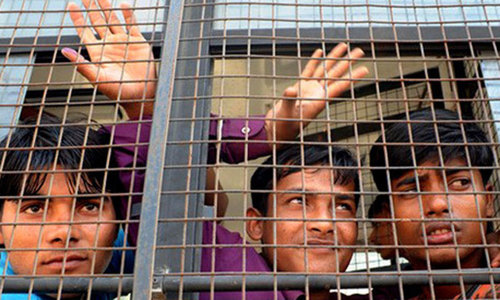LAHORE: The inmates at the overcrowded 42 prisons of Punjab are vulnerable to a possible outbreak/epidemic of AIDS, hepatitis B and C.
It is evident from an official report which reveals that 1,445 prisoners have been diagnosed with multiple diseases amid scarcity of treatment facilities in the 42 jails of Punjab. It says the treatment facilities are not up to the mark for the prisoners having infectious diseases due to overcrowding and unavailability of doctors.
An official says the prisons have become high-risk settings for the transmission of contagious diseases, creating considerable challenge to manage outbreak of the infectious diseases. Currently, he says, out of the 40 doctors, 30 had recently joined while other seats are vacant.
The official says most doctors avoid postings in the jails and get themselves transferred out of the prisons due to the challenging task. He further says it is also a difficult task for the doctors to provide “complete treatment” to the prisoners as many of those diagnosed with infections are kept in the barracks with the other inmates.
A number of captives are suffering from AIDS, hepatitis in Punjab
The overcrowding has also been a challenge as all the 42 jails of the province house three times more population than the accommodation. The report says the jails house 272 prisoners who are suffering from HIV/AIDS, 517 hepatitis C, 137 hepatitis B and 460 prisoners suffering from Diabetes Mellitus.
Similarly, 59 inmates are mentally challenged and of them, 12 were admitted to the Punjab Institute of Mental Health (PIMH) on the recommendations of the medics.
A major threat for the inmates of the jails are drug abusers who have outnumbered others. Many of them use intravenous drugs, says the report.
The data shows 32 prisons of Punjab house 272 inmates who are suffering from HIV (human immunodeficiency virus) AIDS, apparently an incurable disease. The presence of such a large number of HIV/AIDS patients in jails has sent a major alarm.
According to medical experts, once a person gets HIV, he has to live with it for life and if HIV is not treated, it can lead to AIDS (acquired immunodeficiency syndrome).
Of the 272 reported HIV-AIDS patients, most (204) are under-trial prisoners (UTPs) and 64 convicted prisoners (CTPs), according to the report.
Of the total prisoners, 92 HIV-AIDS inmates are found in four jails of Rawalpindi region, including 68 in Central Jail Rawalpindi, three in District Jail Attock, 11 in District Jail Gujrat, eight in District Jail Jhelum and two in District Jail Mandi Bahauddin.
The Lahore region has seven jails where 61 patients are suffering from HIV-AIDS. Of them, 32 prisoners are in Gujranwala District Jail, six in Lahore Central Jail, three in Kasur District Jail, seven in Lahore District Jail, five each in Sheikhpura and Sialkot District Jails and three in Narowal District Jail.
The Faisalabad region jails house 43 HIV/AIDS patients -- 20 in Central Jail Faisalabad, 10 in Jhang District Jail, seven in Faisalabad District Jail and six in Toba Tek Singh District Jail, according to the official figures.
As for the Sahiwal region, the record shows 23 prisoners have been diagnosed with HIV/AIDs infection. There are nine in Central Jail Sahiwal, eight in Pakpattan District Jail, five in Okara and one patient is reported in District Jail Vehari.
Out of 21 such prisoners reported in five jails of Sargodha region, seven are in Hafizabad District Jail, six in Sargodha, five in Central Jail Mianwali, two in Bhakkar and one patient in District Jail Shahpur.
Similarly, 16 HIV/AIDS prisoners are reported in two jails of Multan Region, 11 inmates in the jails of Bahawalpur region and five in the three jails of DG Khan region.
Most of the prisoners are transported from jails to courts in the pending cases lodged against them, further creating risk of transmission of the infection to others.
Similarly, 24 jails of the province house 137 prisoners suffering from hepatitis B, another chronic infection that spreads fast to other people.
The report further shares an alarming number of prisoners suffering from hepatitis C. It says 517 prisoners tested positive for hepatitis C in 33 jails of Punjab.
Out of the 460 prisoners diagnosed with diabetes in the Punjab jails, many require insulin treatment to avoid health complications.
An official, Dr Sibtain Mazhar, told Dawn that all possible measures were being taken to ensure treatment of the prisoners suffering from diseases. He said the Punjab prisons department had engaged the Primary & Secondary Healthcare Department for the treatment through its various programmes.
“We are also trying to ensure the presence of the doctors in the jails to provide uninterrupted treatment to the prisoners,” he said.
Published in Dawn, May 9th, 2022













































Dear visitor, the comments section is undergoing an overhaul and will return soon.